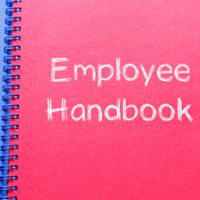Four Important Policies Employers Should Consider to Add to an Employee Handbook

No matter the size, it is important for Florida businesses to consider maintaining policies and procedures for their employees, such as an Employee Handbook. A handbook should give employees a clear direction as to your expectations of their conduct as it relates to the business and their job, as well as their responsibilities. While there is no one-size-fits-all approach to this subject, here are four basic policies that every business should develop and consider incorporating into employee procedure manuals.
- Policies and Procedures Required by Law
Depending on the size of your business, there may be certain laws and procedures that you must follow as required under federal and state law. Many employers who have at least two employees are covered under the National Labor Relations Act and those with a gross annual revenue over $500,000 and are engaged in interstate commerce are subject to the Fair Labor Standards Act. As a business grows, so do the laws it must abide by in operation – including anti-discrimination laws and medical leave policies.
To the extent your business is subject to these policies, it is important to consider including these into the Handbook. If you are not sure, you should consult with an experienced employment attorney.
- Benefits
A Benefits section is not required, but helpful for employees. In this section, you may consider outlining the type of benefits that employees may be eligible for during employment and that you provide such as dental, vision, life insurance, workers’ compensation, retirement plans, paid time off (PTO), sick leave/medical leave, jury duty, parental leave, HSA, and 401k. You may include whether employees must be full time or part time for benefits and when employees can enroll. Typically, Handbooks refrain from listing specific carriers and plan options as those can change from time to time.
- Standards of Conduct/Office Environment
An employee handbook should clearly establish the rules governing conduct within the workplace itself. Some of these rules may be required under federal and state laws – such as workplace safety policies (as well as anti-discrimination policies, discussed above). The policies may also provide for information about what to do in emergency situations and reporting accidents.
A Handbook may also spell out the conduct expected of the employee in the workplace. This may include usage of computer systems and email, substance abuse policies, confidentiality of trade secrets and business information, social media usage, progressive discipline, attendance policies, how employees handle workplace disputes or complaints (conflict resolution and a complaint reporting procedure), and a dress code.
You may also want to include other basic information such as work from home policies, performance reviews, and a payroll schedule. It is always important to have policies regarding how employees (or you) accurately track hours worked (timekeeping), among other metrics, especially because this is typically required by federal law. Consider policies on meal and rest breaks and make sure the policies you adopt are consistent with state and federal law.
- Onboarding and Acknowledgement
At the most basic stage, a Handbook should introduce an employee to the company, so providing information about the company history and mission helps to ensure your employees understand (and abide by) company values and culture. This may also be the place to include your contractual disclaimer (that the Handbook does not create a contractual right to employment) and the at-will statement. Do not forget the Equal Opportunity Statement, either.
But the most important aspect of any Handbook is the employee’s acknowledgment. What good is the Handbook if you do not distribute it and have proof that the employee received it? Make sure to retain the employee’s signed acknowledgement of receipt of the Handbook in their personnel file – whether it is an electronic signature or a hard copy.
Speak With a Florida Employment Law Attorney
These are just a few of the basic policies that need to be addressed in a well-drafted employee handbook. As noted above, every business is unique. If you have questions or concerns about your handbook, or if you are an employee who believes your employer is not living up to its obligations, contact an experienced Florida employment law attorney as soon as possible.
